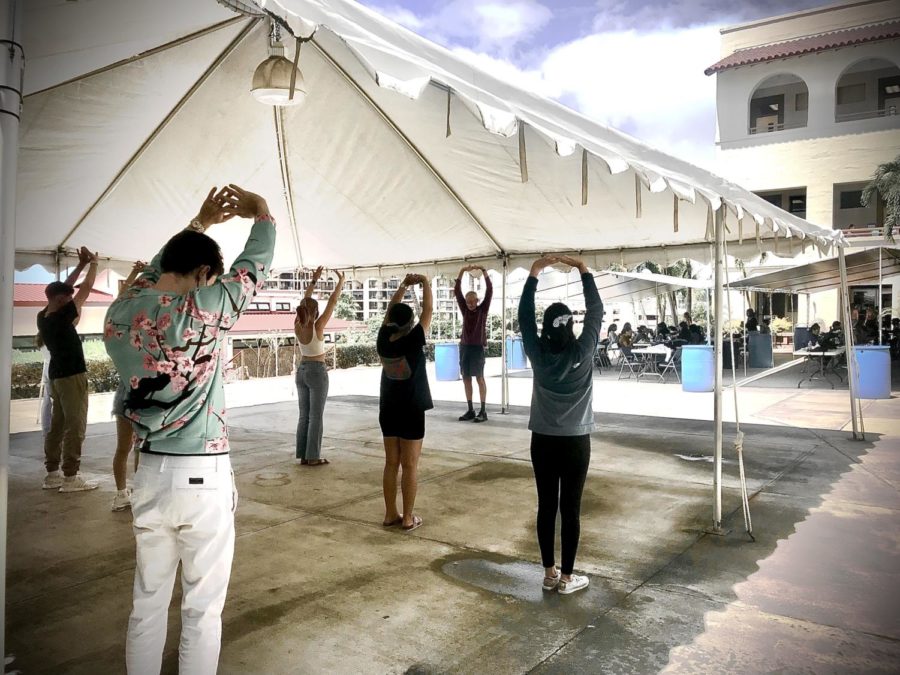Tai Chi With Santee: Be Self-Aware and Ignore the Stares
Chaminade students perform tai chi and qigong prior to their psychology course with professor Robert Santee.
Within the bustling courtyard of Chaminade’s Henry Hall, students enjoy their limited freedom from classroom constraints. Until a student, soon followed by others, walks to the white canopy across the courtyard. Students begin to stretch and move their bodies, acting like they were the protagonist of a kung fu movie. At this moment, many may ask themselves, “What in the world is going on?”
The students across the Henry Hall courtyard are professor Robert Santee’s students. At the start of each of his Psychology classes, students perform tai chi and qigong to promote focus, self-care and reinforce the content learned within the course.
Santee implements tai chi and qigong, both centuries old Chinese practices that focus on the breath and slow movement of the body, in his Psychology courses to respond to the increasing stress and anxiety levels of attending university. He explained that while college is meant to be academic, it lacks a holistic approach.
“Why aren’t we dealing with the whole person?” Santee said. “You go to university, and it’s pretty much academic. … That becomes an issue.”
Despite the good intentions, practicing tai chi and qigong in front of passing students leads to the inevitable lingering stares, confused looks and even, awkwardly, students recording the class with their phones.
Some students questioned the reasoning behind tai chi being performed outdoors rather than within the classroom. Santee responded to this by explaining the importance of finding your focus within a distractible environment.
“It’s an environment where other people are walking around, and cars are driving. So it creates distractibility,” said Santee, who has been working at Chaminade for 27 years. “In that distractible environment, are you able to stay calm? Are you able to stay focused?”
When asked about the responses of onlooking students and staff, Santee explained that onlookers might not understand the purpose of the exercises. Thus, they will respond to the situation in a way they find suitable.
“When you look at something that you don’t understand, the only way you can deal with the anxiety, because you don’t understand, is by making fun of it. When you make fun of it, you feel better,” said Santee.
As students continue to partake in the regular exercises, some have become accustomed to the practice.
“At first, I was a little embarrassed because everyone’s always watching us,” said Codi-Lee Reiny, a Psychology major and current student in Santee’s psychology for health and stress course. “But after that, I started not to care that much. And if people look at me, I’ll look back at them.”
Chaminade 2019 alumna Jordan Miyata graduated with a bachelor’s degree in Psychology and took several of Santee’s classes.
“I know a lot of us deal with a lot of stress and anxiety on a day-to-day basis so I really felt that this class really helped to get a hold of what I was dealing with and just find a balance in how to do everything,” said Miyata. “I actually really enjoyed it and took a lot away from it.”
According to the Anxiety and Depression Association of America, 85% of college students report that they felt overwhelmed by their personal and academic responsibilities at some point within the past year. In addition, about 41.6% of students stated that anxiety became a large concern of theirs.
“Give it a chance, try to have an open mind about it” said Miyata. “You might not realize that it could actually be beneficial.“
